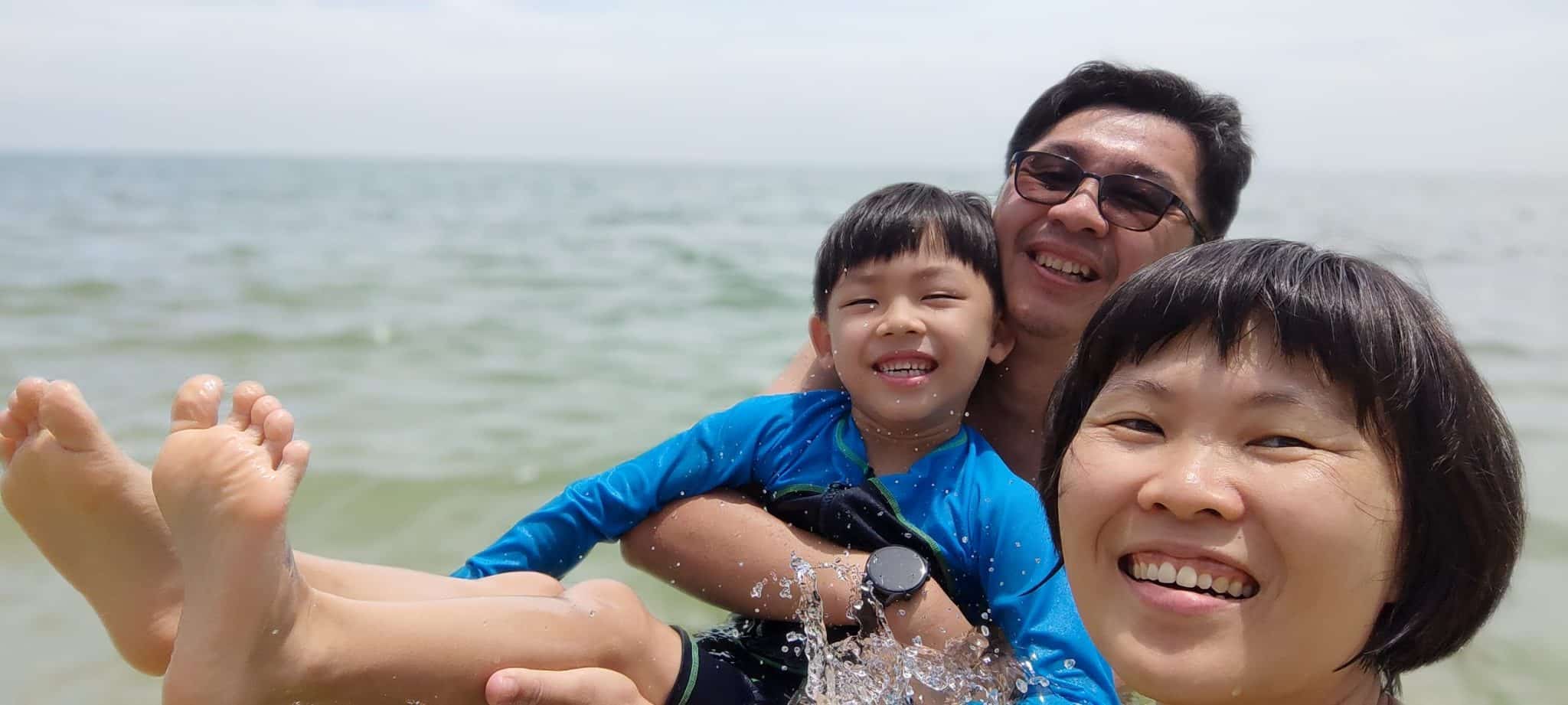What do you do when God doesn’t heal? Salt&Light Family Night panellists talk about living in faith despite disabilities
by Christine Leow // November 3, 2022, 2:05 pm
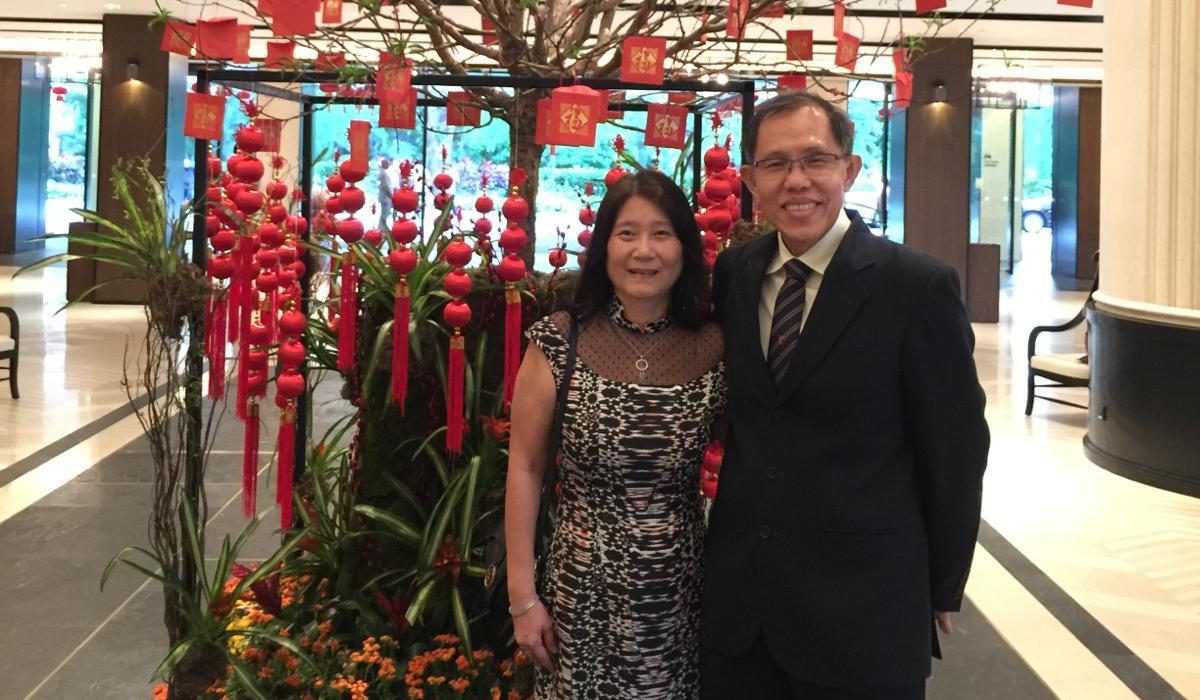
Peter Tan and his wife Stacey who has been his "eyes" since he became legally blind. Photo courtesy of Peter Tan.
Peter Tan was born with a genetic eye disorder called retinitis pigmentosa (RP). His retinal cells break down gradually over time, causing loss of vision. For some, RP begins with a loss of night vision. Then, the peripheral vision and central vision become affected. Others have trouble discerning colours as well. There is no treatment or cure, according to doctors.
“I was praying, ‘Will this be my time when You will heal me?’ Well, it didn’t happen.”
Peter knew of his condition since his teens but only started experiencing its effects in his 30s. Slowly, his eyesight became so bad that he did not trust himself to drive. He wondered if he could be effective in his job as a principal.
Now 62, Peter has had this condition “for the better part of my life”. Many have prayed for him, something he gladly receives. Peter himself believes in healing.
“Many times in the Bible, Jesus healed the blind,” he said.
On a trip to Israel, Peter wondered if he would be similarly healed.
“I was praying, ‘Will this be my time where You will heal me?’ Well, it didn’t happen. But I believe God has a purpose in our lives. Despite my condition, God has surrounded me with many people. My wife has been eyes. I have my children and now the love of my grandchildren. God has been really good.”
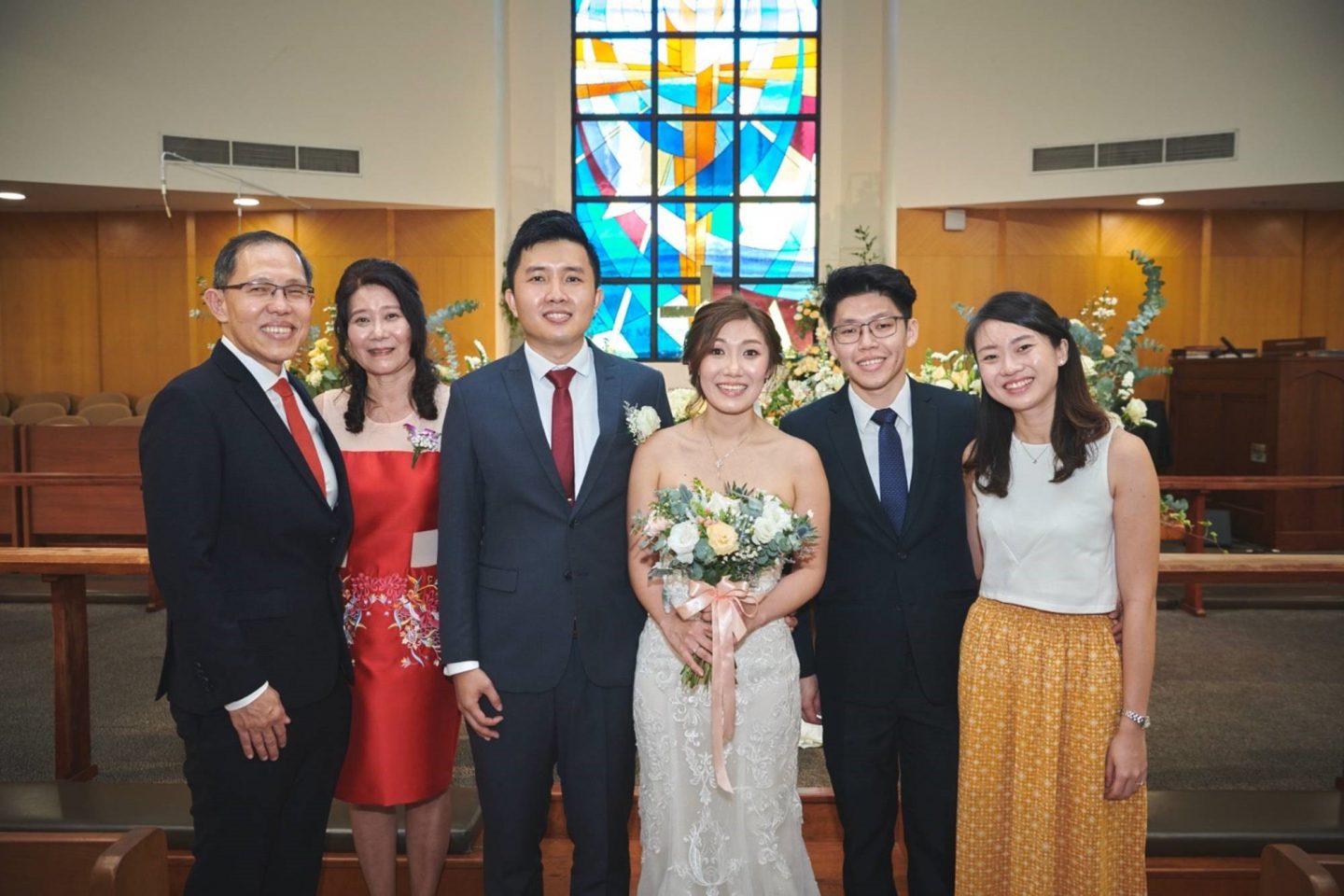
Peter with his wife, Stacey, and their children at their daughter’s wedding. Photo courtesy of Peter Tan.
Peter, who spent 18 years as Principal of ACS (Junior) and ACS (Barker Road) and is currently the Principal of Queensway Secondary School, was among the panellists on Salt&Light Family Night’s (October 25) episode on how faith and disability can co-exist.
Joining him on the panel were DG Carole Ann, a 44-year-old who lost all her limbs to gangrene, and Joshua Khoo, 29, who was born with achondroplasia, a bone growth disorder that results in short stature.
Over 160 people attended the Zoom chat show, 70% of whom were healthy but knew of someone with a permanent medical condition. Nearly one in five “was not feeling well” while 14% had a permanent medical condition.
One of the main questions the viewers had for the trio had to do with the lack of healing of their disabilities. How can bitterness be managed when God does not heal? How do you view healing when you have a disability? How do you encourage someone to still trust in the God of miracles?
8 things to remember when God does not heal
The panellists shared from their heart about their struggles, and how they reconcile faith with disability:
1. See the miracles that are, not the healing that isn’t
Even as his eyesight was failing and the healing he sought was absent, God still gave Peter a taste of some kind of healing.
“I don’t know if God will ever (heal me), but I have been so blessed in my life.”
In 2014, he developed a blotch in his eye “the size of my palm when I hold my hand a foot from my eyes”.
“Wherever my head turned, that area was blocked. I was really struggling to read the computer screen because our retina is made out of different layers of cells. So, if I could quickly move my eyes, I could catch the words. It was very tedious, very tiring.”
That year on Good Friday, there was a time of worship and prayer in Peter’s church. About 30 people attended. As the evening drew to a close, the leader asked those who wanted healing to stand up.
Not wanting to be disappointed again, Peter remained seated. But after the third invitation, he found himself standing up. People gathered around him to pray for him.
“A good friend of mind was standing behind me and he laid his hand on my back and he prayed for me.
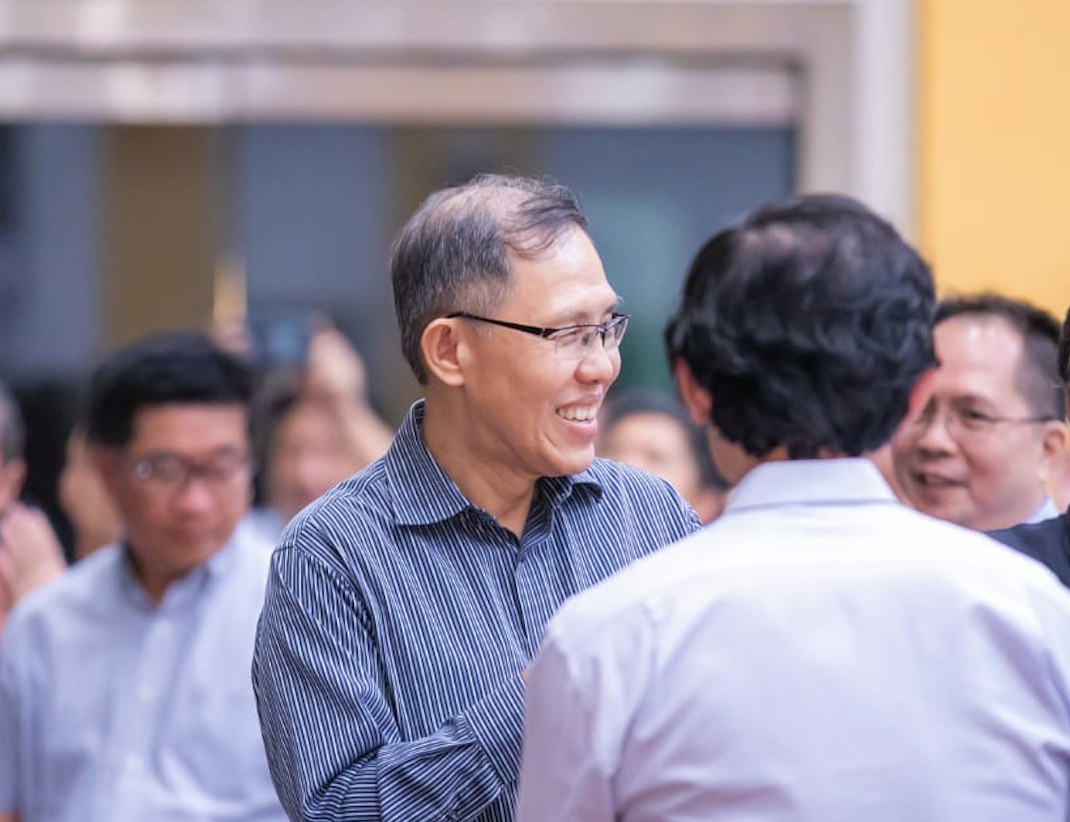
Many have prayed for healing for Peter over the years and he believes in healing as well. Photo courtesy of Peter Tan.
“For the first time in my life, I was slain in the Spirit. I lay on the ground, felt a warm feeling in my body and something move around in my eyes. I didn’t know what it was.”
“I woke my wife up and said, ‘I can see. I can see.’ Till today, the blotch hasn’t come back.”
But when Peter stood up, the blotch was still there.
“I said, ‘Never mind. Praise God. He loves me even though there is no healing.’”
Saturday came and went, and there was no improvement. On Sunday morning, Peter was brushing his teeth when he felt “something was different”. He realised that he could see his face in the mirror.
“I woke my wife up and said, ‘I can see. I can see.’ Till today, the blotch hasn’t come back. Other parts of my degenerative eye disease have continued to happen. I don’t know if God will ever do anything (to heal me) but I have been so blessed in my life.”
Those blessings go beyond physical healing. Peter counts supportive friends, caring colleagues and his loving family among the blessings from God.
Joshua has experienced a similar miracle healing.
Before he was born, his doctor told his parents that their second son would be born with four short limbs.
“It was a tough decision to accept that your child will be born like a special needs kid.”
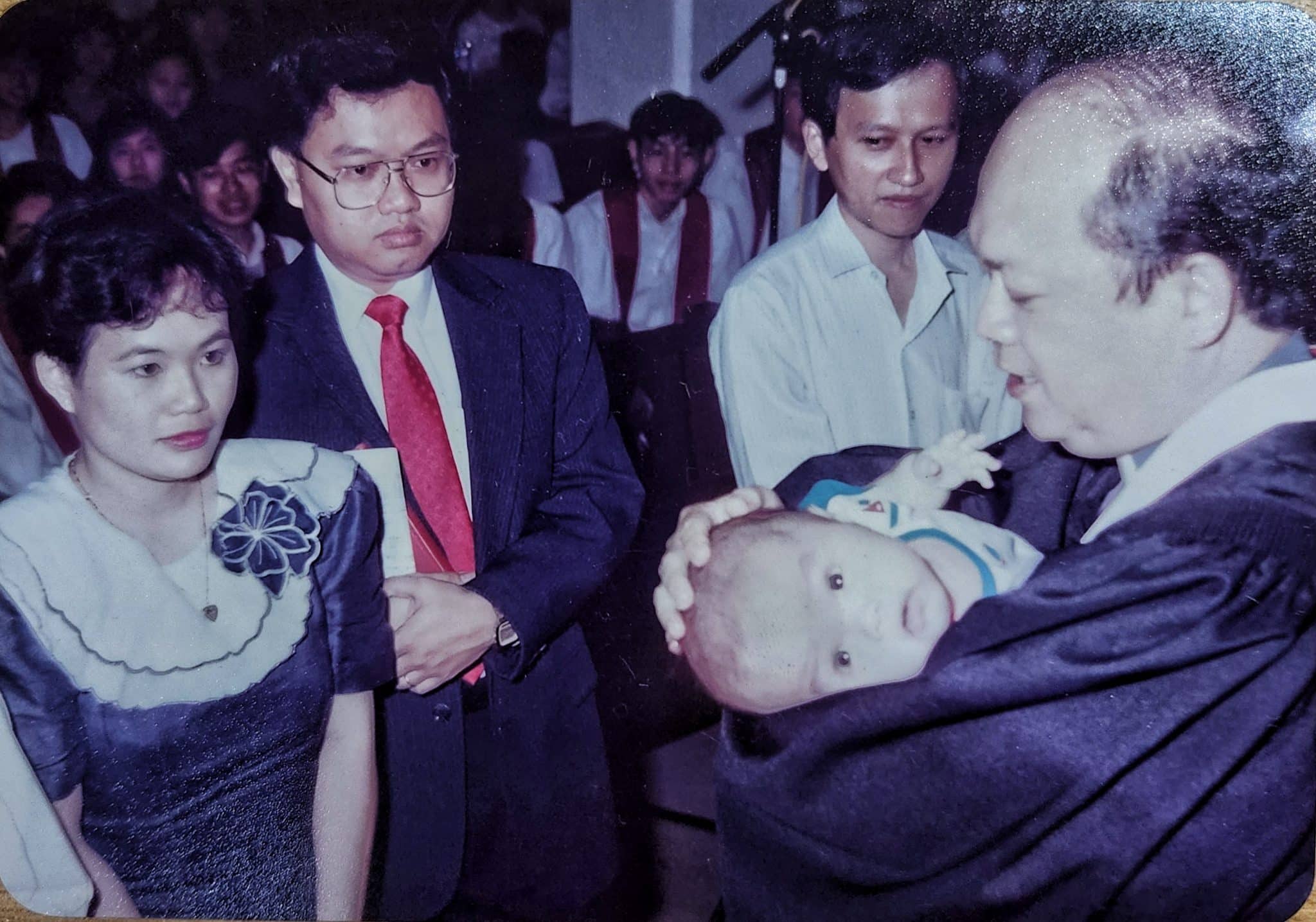
Joshua being baptised as an infant. Photo courtesy of Joshua Khoo.
From the age of one, Joshua had to undergo weekly physiotherapy because he could not walk like toddlers his age.
“My dad put full faith in Him and released me. I started to take my first few steps.”
By age four, he still could not walk. His parents consulted seven different specialists. They told his parents that Joshua would have difficulty walking.
People with achondroplasia often develop spinal stenosis. As their spinal bone or vertebrae grows abnormally, it forms in a way that gives the spinal canal less room. This leads to compression of the spinal cord, resulting in weaker legs that make walking difficult.
Despite the dim prognosis, Joshua managed to walk when he was four.
His family had made a practice of taking young Joshua swimming regularly to help strengthen him. His father had taken him to the pool that day.
“God impressed a Word in my dad’s heart, that particular phrase ‘release your son’ and God will do something miraculous in front of his eyes. My dad put full faith in Him and released me. I started to take my first few steps at a swimming pool. That was the first miracle that my dad witnessed in his life.”
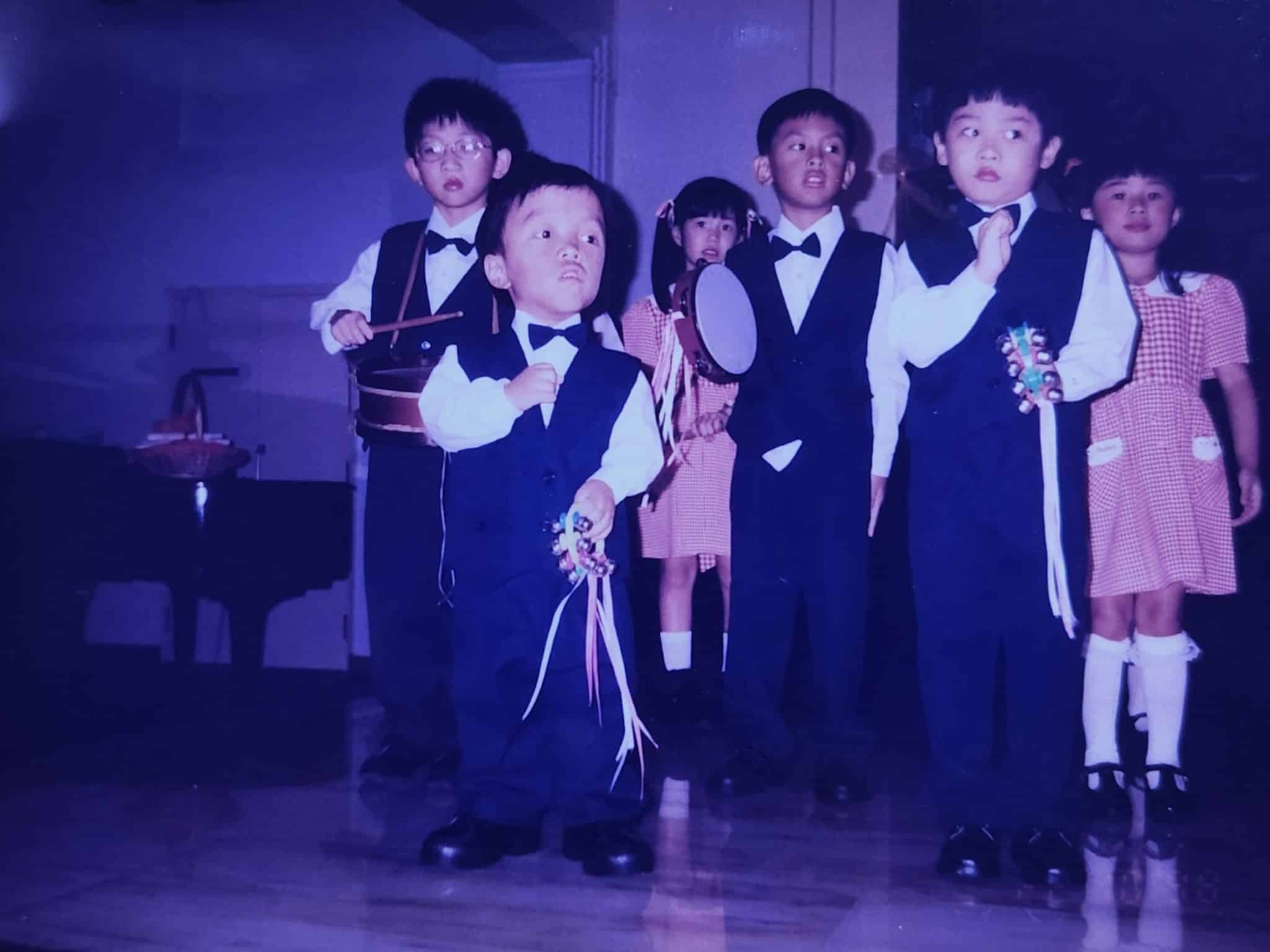
Mainstream kindergartens refused to take Joshua in. He only managed to find a place in a church kindergarten when his aunt, who worked there, promised to take care of him. Photo courtesy of Joshua Khoo.
Carole, who nearly died from complications resulting from a burst ovarian cyst, received a miraculous healing as well.
“If you look at the number of people who have passed on from septic shock, I am a survivor, I am a miracle child. Perspective is everything.”
2. See the gifts He has given
Said Joshua: “I always share with people to focus on our strengths and gifts.”
“I am hoping for a miracle to happen. But meanwhile, I will be using the gifts to serve Him.”
At 11, he discovered that he could drum despite not having taken any lessons. He started serving in his church’s worship team. Then, at ITE, he found that he could take gorgeous photographs. This led him into a career in photography.
“As Christians, we put our faith in Him knowing He has a greater plan for us even though we can’t see that far. I know that I have put my faith in Him and He has strengthened me throughout the years.
“I am hoping for a miracle to happen that the bone will continue to grow. But meanwhile, I will be using the gifts that He has given me to serve Him and the community, and glorify Him alone.”
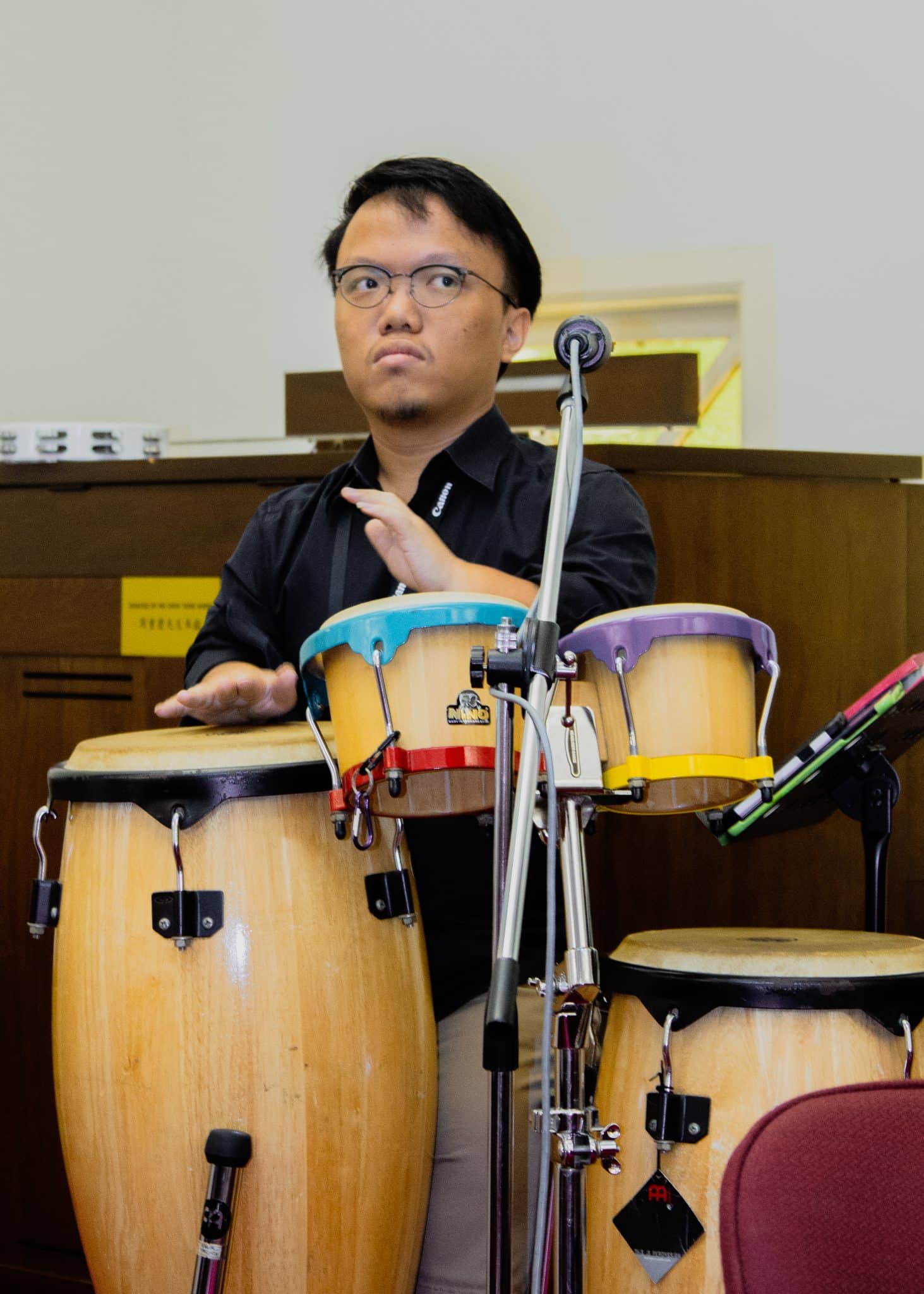
Joshua serves in his church’s worship team.. Photo courtesy of Joshua Khoo.
Despite being legally blind, God has enabled Peter to continue being a principal. Next year, he completes his 40th year as an educator.
“When I look back at my life, I feel so blessed to have been able to serve in church and the Ministry of Education.”
3. Trust that God still leads
Four years ago, Carole was preparing to go to work when she was seized by what felt like stomach cramps. The pain was so excruciating that she ended up at the A&E.
“God has the last say. He is orchestrating His Kingdom and we are part of that Kingdom.”
There, doctors discovered that a cyst on one of her ovaries had raptured. This caused infection to flood her body, sending Carole into septic shock. Her organs were in real danger of shutting down one by one. So, she was put in an induced coma in a bid to save her life.
But the medication resulted in gangrene developing in all her limbs. She woke up from a month-and-a-half-long coma to blackened hands and legs.
“The condition when I looked at it was impossible. Looking at the dead part of my body, many times I broke down with my mum. I have asked, ‘What is happening? What is this? Why did it happen?’”
In her despair, God “covered” her and she remained calm. That stillness of the soul was what sustained her during the many months in the hospital – in the ICU and then the general ward – as well as the months that followed at home as she battled the gangrene. It is what has been sustaining her since.
Eventually, Carole had her two hands and her two legs amputated. She uses a wheelchair and types with a stylus attached to her wrist.
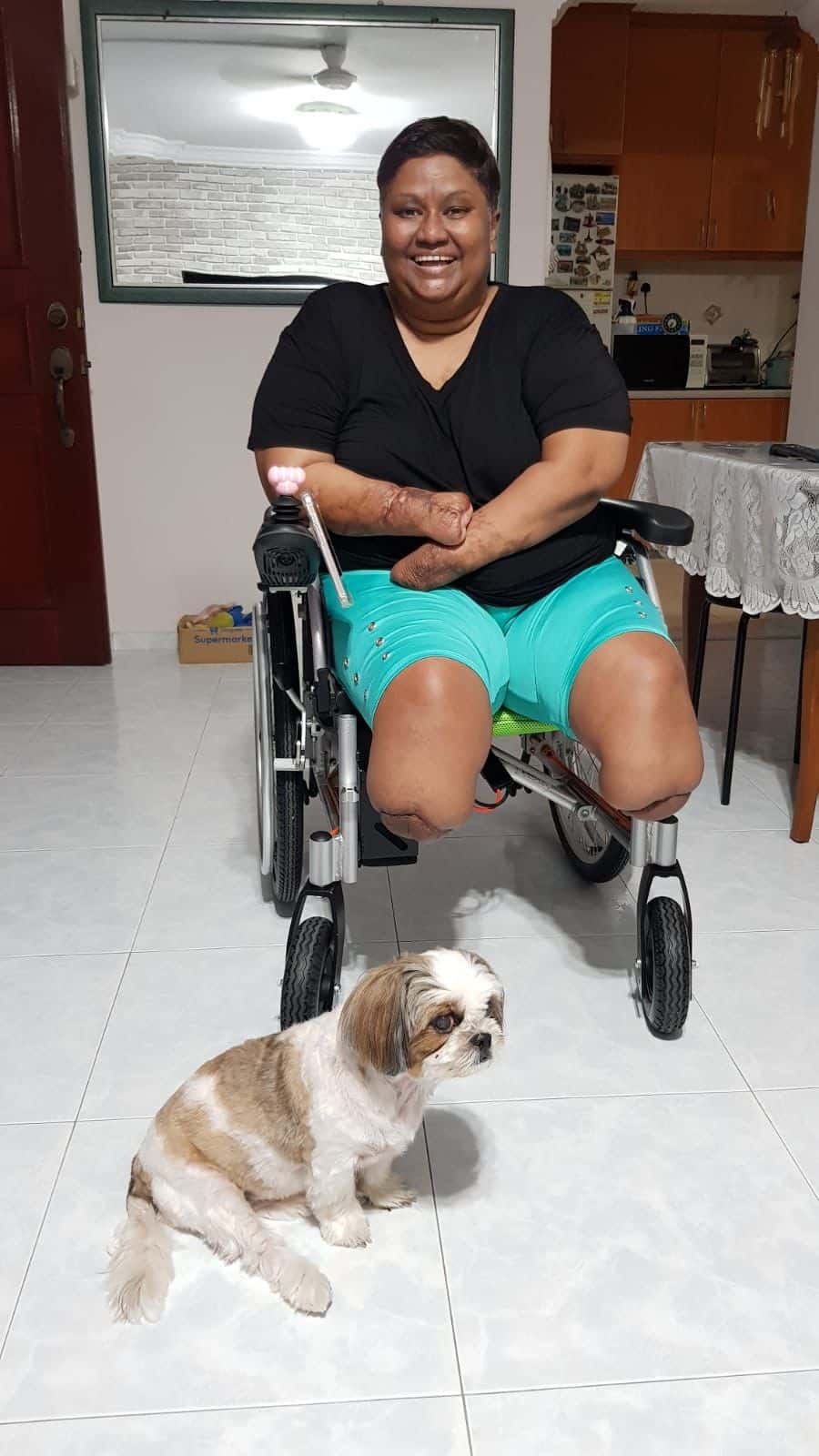
Despite the fact that she lost all four limbs, Carole has found joy in life. She is seen here with her dog from whom she draws a lot of comfort as well. Photo courtesy of DG Carole Ann.
While she did not receive the healing for which she and those around her prayed, God worked a transformation in Carole’s life.
“If you look at the number of people who have passed on from septic shock, I am a survivor, I am a miracle child. Perspective is everything.”
Once a hard-partying girl who admitted that her relationship with God was just “a routine thing”, her ordeal has given her a trust in God she had never had before.
“If you obey and keep your trust in Him, He will proceed with whatever He needs to do for you. Even when you don’t see the end, you will arrive.
“I don’t think the picture is for you to really know where the end is. That’s how I dealt with things. I didn’t ask too much about what is the end. I just went on what’s tomorrow, what’s the next step.
“God has the last say. He is orchestrating His Kingdom and we are part of that Kingdom.
“He has a reason for everything He is orchestrating. For us, obedience is important.”
4. Believe in God’s goodness
“We believe Him for healing. But we still love Him and live well without,” said Carole resolutely.
“When a perfect God loves us, just trust in Him.”
This is how she continues to believe that God heals while living with her condition.
“Your approach to God should be as a child towards a father or a mother. God does not want us to have any of these ailments. He is a perfect God. He wouldn’t want that for us.
“But we live in a broken world. Things happen. The approach to God when I look at Him is that I don’t want Him to cry or be upset over what has happened. I just want to live well. If He wants to give me back my hands and legs, well … But the relationship with Him is not going away, hands or no hands.”
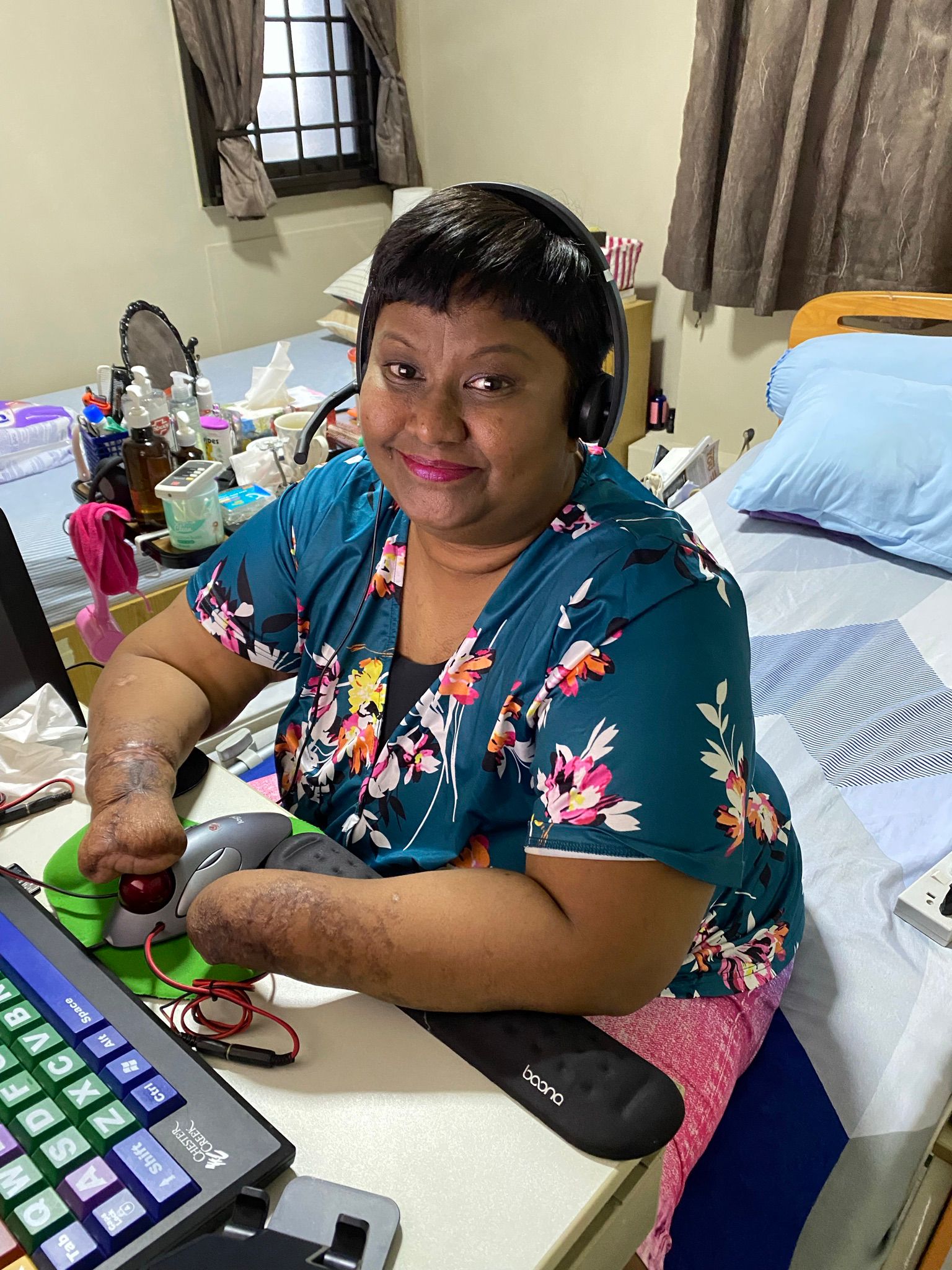
Carole is thankful that she can still work because she only had her hands amputated instead of her arms, as the doctors had initially planned. Photo courtesy of DG Carole Ann.
Carole has come to a point where she can see the goodness of God in her disability. With everything going online, she has been able to work from home.
“God is perfect. We are imperfect. When a perfect God loves us, just trust in Him. Even in the worst scenario, even if it may not happen the way you want, even in the impossible, the closeness, the forgiveness that happens, these are miracles, too.”
5. Set your mind on God, not the disability
The panellists agreed that, often in the face of disability, seeing the good is tough.
Said Carole: “When you are looking at something, it is very easy to perceive the condition as it is because we live in a society today where the facts talk louder than God’s hand. Seeing is believing.”
Joshua has had the same experience.
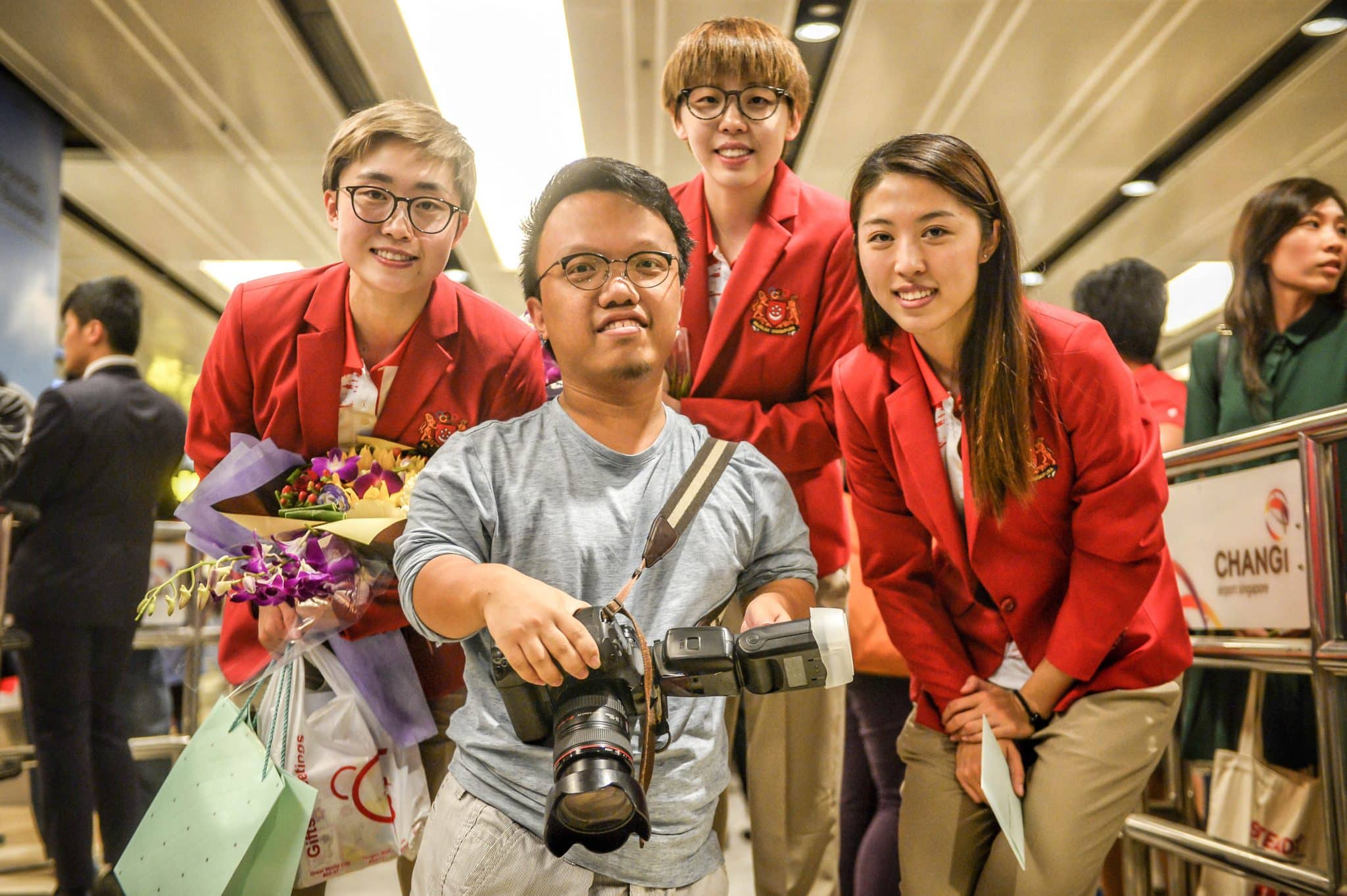
His job as a freelance photographer and given Joshua many opportunities to meet celebrities and dignitaries. In this photograph, he is with Singapore’s national table tennis team. Photo courtesy of Joshua Khoo.
“I encounter this almost every day in my life when I walk down the streets. Whenever I meet people in public spaces, teens, children, they will say it very bluntly, ‘Why is this kor kor (older brother) so fat and short? Why is he born like that?’ Since young, I have been facing this question day in and day out.
“I disallow this negativity to reign in my life because God is the One who takes control of all things. It is still a tough journey to go through but with God’s help, anything is possible.”
The verses on which Joshua chooses to focus are Hebrews 11:1-3.
6. Have a humble attitude towards God
When tempted to be bitter towards God for his situation, Peter turns to Romans 9:20-21.
“When I read that verse, I felt very humbled. God is the Maker, we are not. I had cried to Him for help and to heal but God has chosen not to. Who are we to complain?”
While he believes in asking for healing, Peter is against demanding it of God.
“If God is God, God decides. We don’t tell God what to do. If we tell God what to do, we are God, He is not God. I would rather worship a God who is control.”
7. Release your anger
Added Peter; “When we hold that grudge, that anger towards God or towards another person, bitterness will grow. The antidote is to release that bitterness to God.
“If you do not forgive someone, it’s like you are taking poison and hoping the other person will die. When you hold anger, bitterness within your heart, that’s hurting yourself. Once you release it to Him, you find it releases us to live our lives with purpose.”
8. Let God use you
Carole said that until her brush with death and her amputation, she had never quite understood the love of God. Now, she can truly see herself as God does.
“As long as we put our hands in the hand of God, that is better than any known way because His ways are higher than ours.”
“So, your Papa in heaven is looking at you and proud of you and the relationship between you and Him. You make Him proud even in your brokenness.”
That perspective helps her be an inspiration to others, particularly younger people who rail against God.
“When you walk with these young people, they are waiting to see if you drop the ball or break down. Sometimes, it’s not wrong to break down and show your weakness as a person with disabilities.
“But when you pick yourself up, like what my scars show, it can tug at a lot of young people’s hearts.”
Towards the end of Salt&Light Family Night, a viewer spoke up to encourage the panellists. Calling himself Ephraim, he shared that he has been a paraplegic since the age of nine.
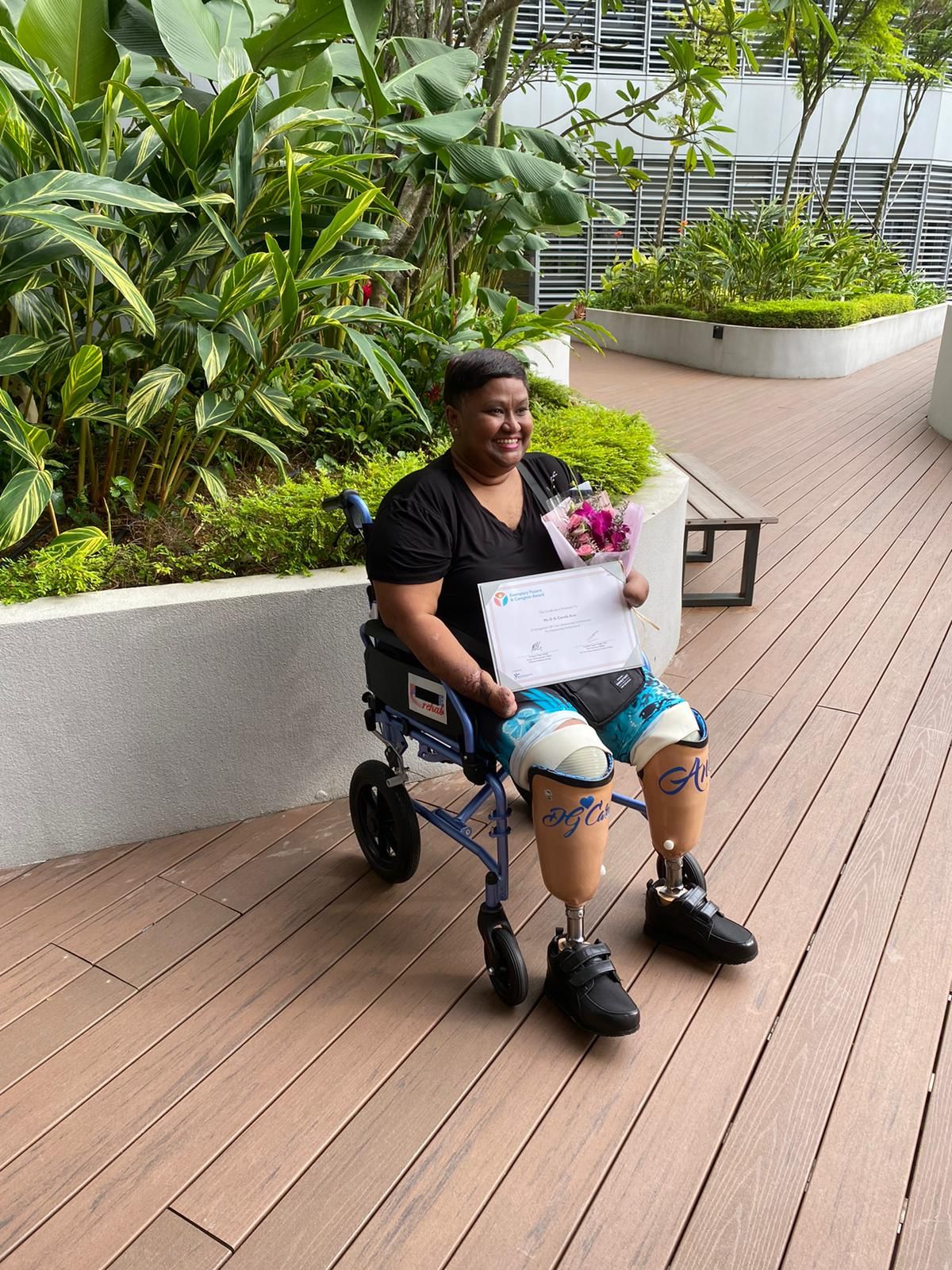
Carole recently took up wheelchair rugby. Before the amputation, she did not like sports at all. Photo courtesy of DG Carole Ann.
He said: “Sometimes even though we have good moments, we also have very bad moments. That reminds me that in life there can be darkness.
“As long as we put our hands in the hand of God, that is better than any known way because His ways are higher than ours. Every step of the way, He shows His grace and mercy that endures forever.”
Encouragement for caregivers
Among the viewers were also caregivers. One asked Carole if those in a coma could hear things around them.
“The more we are a blessing, the more we feel God’s love.”
Replied Carole: “I felt myself fading away and then I would hear music and I would come back again. My family just kept looping Christian music – Paul Wilbur, Bob Fitts. They kept playing in loops for that time when I was in a coma.
“When I woke up and I heard the songs a while later, I had a feeling of remembering the songs in my subconscious. There was something there in the songs. I was feeling very close to the songs.
“Pray for them, they can hear.”
Peter’s wife is his caregiver.
“She helps me navigate through the streets when we are out shopping, making sure I don’t walk into things, guiding me up and down stairs.”
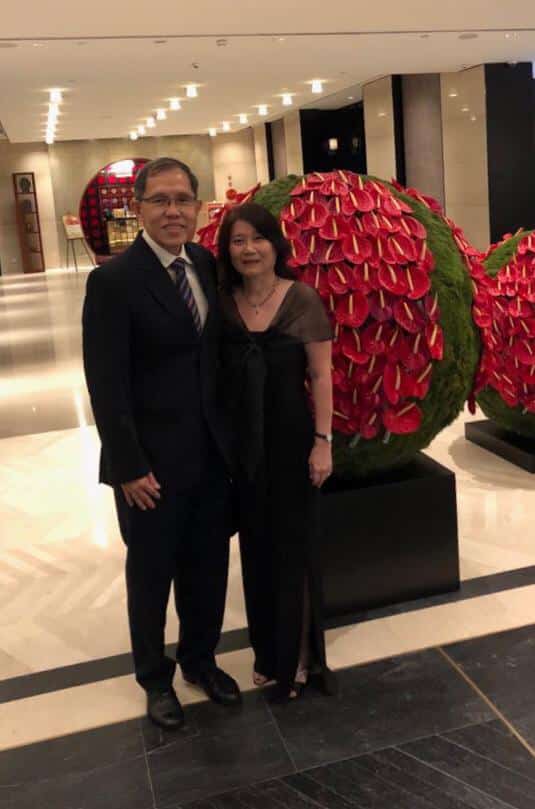
Peter and his wife Stacey. Photo courtesy of Peter Tan.
The responsibility is great and Peter is always thankful when people look out for his wife as well. Sometimes, when they are invited to a party, they tell the couple not to bring any food with them.
“’Just bring Peter’, they say. Or like when you offer to give me a lift home so she doesn’t have to come get me.
“Little things make a lot of difference because they give the caregiver the breathing space to do things on their own. Think of how you can be a blessing. The more we are a blessing, the more we feel God’s love.”
This report is Part 2 of the Salt&Light Family Night episode on How do I reconcile my faith and my disability? You can read Part 1 here.
A full recording of this episode will be posted on the Salt&Light YouTube channel at the end of the week. You can watch past episodes of Salt&Light Family Night on our YouTube channel here.
RELATED STORIES:
“Disabled does not mean unable”: 10 persons with special needs ascend Mount Fuji
“Disabled people are not God’s afterthought,” says pastor with cerebral palsy
We are an independent, non-profit organisation that relies on the generosity of our readers, such as yourself, to continue serving the kingdom. Every dollar donated goes directly back into our editorial coverage.
Would you consider partnering with us in our kingdom work by supporting us financially, either as a one-off donation, or a recurring pledge?
Support Salt&Light